It’s always been important for a business to have a good reputation, because if people like your brand, they’re more likely to interact with it.
And, in the age of social media and technology, this couldn’t be more true.
Relationship marketing is a huge part of this. It’s all about making the customer feel heard and appreciated, so that they want to continue shopping with you. Because, for many businesses, customer retention is key. Without it, you’re constantly searching for innovative ways to reach new customers, which can be costly and time-consuming.
So, if you want to find out more about relationship marketing and why it’s important for your business, read on.
What is relationship marketing?
Relationship marketing is about forming a strong emotional connection with the customer. The goal is to make the customer feel valued and appreciated. And, in turn, it is hoped they stay loyal to your brand and convert into repeat buyers.
Although this method of marketing focuses on customer satisfaction rather than sales, there can be a direct impact on sales through this long-term customer loyalty. In fact, a 5% increase in customer retention correlates with at least a 25% increase in profit. So, businesses will do well to ensure their customers are happy and engaged.
This relationship builds throughout the customer journey. Through targeted messaging, excellent customer service, and special offers, amongst other tactics.
As technology evolves, so has relationship marketing. Social media platforms like Facebook and LinkedIn, along with mobile phones, have meant that brands are expected to be contactable at all times. This goes hand-in-hand with relationship marketing.
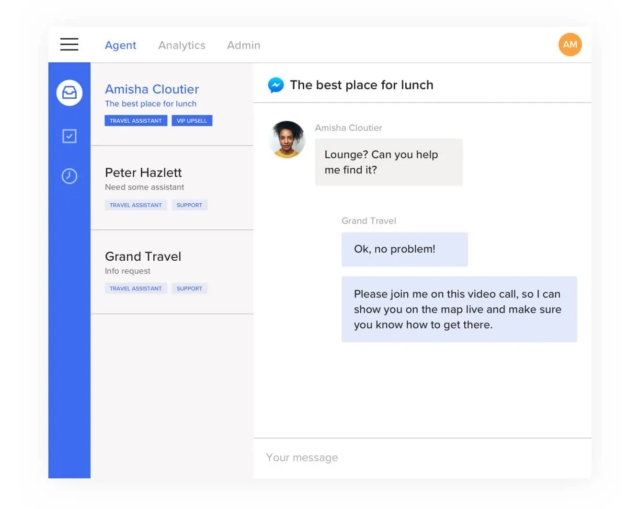
To avoid missing important messages from customers, organisations should invest in software like RingCentral. This useful customer engagement tool lets agents communicate with customers:
- Over the phone
- By messaging
- By email
- Via social media
It even utilises artificial intelligence to automate the process and ensure the customer is connected with an agent who has the right skills to solve their particular query. This helps to uphold strong relationships with customers because they are provided with information that directly suits their needs.
The difference between transactional marketing and relationship marketing
Many businesses are greatly geared toward transactional marketing. This marketing method doesn’t aim to build long-term relationships, rather it focuses on individual transactions. Relationship marketing, on the other hand, does focus on building connections with customers with an eye on building long-term brand loyalty. Both have their own benefits, so let’s look into the key differences between the two:
Transactional marketing
- Focuses on short-term – This marketing plan is all about making the sale and therefore works on a shorter timescale.
- Little contact with the customer – There is limited contact with customers because it’s based around one-time sales. There’s no need to build any sort of relationship with customers to encourage repeat custom.
- Centres on undertaking transactions – The sole focus is that customers buy the new product, so this strategy focuses on adverts, pricing, and marketing to entice new customers.
- Little emphasis on customer service – If you don’t plan on nurturing your customer relationships, then customer service isn’t the top priority.
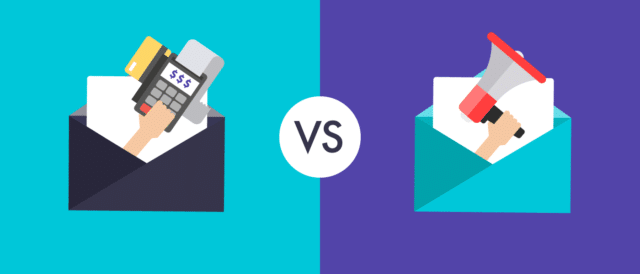
Relationship marketing
- Focuses on customer retention – Retain and satisfy current customers and provide value to them. Uses customer relationship management to do this.
- Frequent contact with the customer – Uses personalised adverts and messaging to reach existing customers. Replies to comments and direct messages on social media platforms.
- Centres on building trust – Be honest and open in dialogue with customers, and keep them involved in various happenings in the organisation. For example, showing how one of your best selling products is manufactured.
- High level of emphasis on customer service – Focuses on being there 24/7, whenever customers need them.
Examples of relationship marketing
Here are some companies that are doing relationship marketing right:
Starbucks
Seattle born coffee shop Starbucks is a firm favourite across the world. So, how has it grown into such a global force? Through effective relationship marketing.
The brand strives to forge close relationships with its customers, and its marketers use several techniques to do this.
The first is the most simple. They write the customer’s name on their coffee order. So, when their order is made, their name is called out and they collect their drink. It seems simple, but this personalised gesture makes the customer feel special and appreciated.
Starbucks also promotes comfort and peace at its coffee shops, and this is included in their policies. If you just need somewhere to sit with wi-fi, you can do so without the pressure of ordering a drink. This adds to the idea that the brand is inclusive and open to everyone, something that many customers appreciate.
In terms of digital marketing, Starbucks has also nailed this. They send frequent emails to their customers, to keep them informed of promotions and product launches. Their social channels also tie in with their email marketing, ensuring that their brand messaging is consistent.
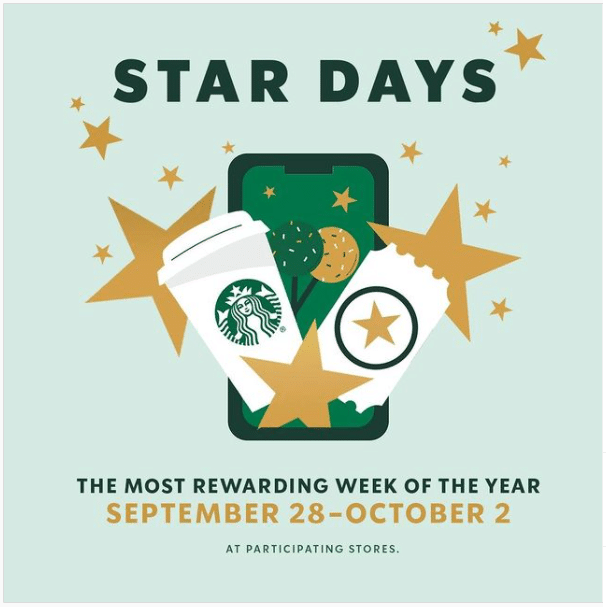
Starbucks also has its own reward card. Loyalty programs are one of the best ways to encourage repeat customers, because they can earn rewards and access special offers. This also allows the brand to monitor consumer activity. Though to some people this may sound intrusive, according to Hubspot, 87% of people are open to this if it means it leads to more personalised rewards.
Innocent smoothies
Innocent Smoothies understands its demographic, and has used this knowledge to build personal relationships with customers. Tongue-in-cheek Tweets and humorous Instagram posts have caused them to be a viral sensation, on more than one occasion.
A friendly tone of voice is one of the main things that keeps customers engaged and amused. This is present on packaging, as well as the brand’s social media accounts. It makes customers feel like they’re talking to a friend, rather than a hugely successful drinks company.
What’s more, one of their biggest achievements is ‘The Big Knit’. From 2003, Innocent Smoothies has put little knitted hats on the lids of its smoothies, and donated 25p of the proceeds to Age UK. They’re knitted by a loyal army of volunteers, young and old, who want to get involved for a good cause. They’ve raised £3 million for Age UK over the years. Not only is this excellent for the charity, but also great for Innocent Smoothies which now has a great reputation, and an eager customer base.
Etsy
Etsy is similar to Amazon, in that it’s an ecommerce site that allows individual sellers and small businesses to sell products on its platform. However, unlike Amazon, Etsy is populated by handmade gifts, craft supplies, and unique items that are more personalised. The brand doesn’t churn out adverts and marketing campaigns, instead, it relies on word-of-mouth and sellers.
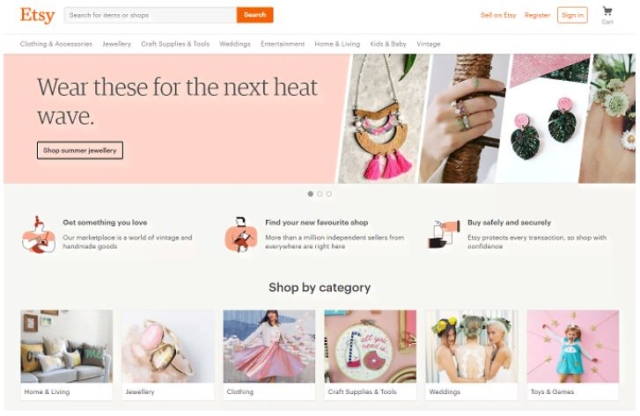
And one of the biggest brand advocates for Etsy is Drew Barrymore, who announced to her 13 million followers the following message; “The Etsy community is so thoughtful and connecting in such an art form in this time that I couldn’t be more appreciative.” Who needs influencer marketing, when you have Hollywood stars endorsing your business for free?
Customer service is also a big part of Etsy’s ethos, from the main website to the brand’s social pages. This personalised approach is how Etsy has gained and kept many customers, a great example of how to use relationship marketing the right way.
Importance of relationship marketing
Relationship marketing, when used in the right way, can be more profitable for businesses in the long-term than traditional marketing techniques. This is because it aims to promote repeat custom, increasing customer lifetime value. A study by Bain & Company revealed that just a five percent increase in customer retention can increase revenue by 25% to 29%. Thus, customer retention should be considered a crucial part of any business model.
What’s more, relationship marketing can be important for a brand’s reputation. Creating a positive, lasting impression, is vital for businesses. Here’s why first impressions last forever:
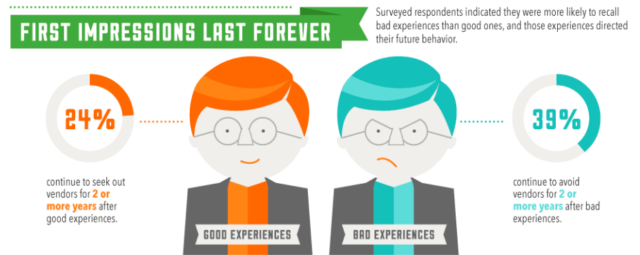
So, when consumers have a bad customer experience with a brand, 39% of them say they will avoid them for two or more years after the experience. And, those who have poor experiences are likely not to recommend your business to a friend, meaning you lose that important referral. This can be damaging to your reputation and bottom line.
By using relationship marketing, with an emphasis on good customer service, you can change this. Platforms like RingCentral, in particular, are great for brands who want to step up their customer service support.
You can keep all your digital interactions in one place, meaning that your agents are all working from the same system. This will make customer service a smoother process, and ensure no customer is left behind.
Benefits of relationship marketing
Here are the main benefits that come with relationship marketing:
- Encourages customer engagement
- Increases customer retention
- Builds trust between the brand and consumer
- Can be profitable in the long-term
- Helps to establish your brand identity
- Builds brand awareness
How RingCentral solutions support relationship marketing
If you want to include more relationship marketing strategies in your business, then you’ll most likely want to look at how you handle customer service. Customer service is a crucial part of relationship marketing efforts, particularly when it comes to keeping customers happy and engaged.
A tool like RingCentral can be used to support your relationship marketing goals because it offers a range of features that can enhance customer service.
To start, it includes intelligent routing and workforce optimisation, to make inbound correspondence easier to manage. This AI-backed technology uses automation to pair the customer with an agent with the right skills to assist with their problems. And, if an agent needs help from an expert, they can contact an advisor to discuss it further. This ensures the customer is always getting the correct information.
What’s more, with RingCentral, customer questions can be answered over the phone, email, text, and social media platforms. And, agents can manage their responses all in one place. This is key for making the customer service process a more seamless one, for both the agent responding and the customer.
If customers are left waiting, or simply receive no reply at all, it can cause them to lose interest. Similarly, they may feel frustrated if a problem with their order isn’t acknowledged, and this could mean they leave you a bad review or avoid shopping with you altogether.
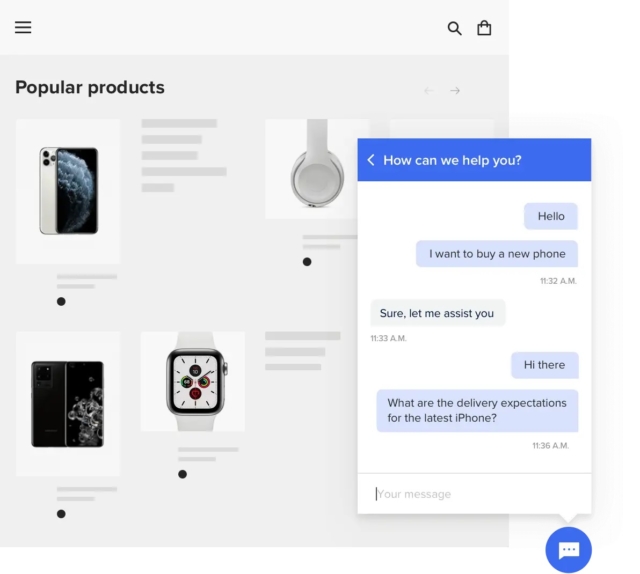
This tool can also be used to boost sales thanks to its analytics that track volume and activity across every interaction. You can use this data to establish how well your relationship marketing strategy is doing, and identify areas where you may need to improve. For example, your team may be great at giving the correct information to customers, but the response time may be a little slow. You can then adjust your strategy and KPI metrics accordingly.
As well as this, you can integrate your CRM with RingCentral. Just connect and embed your support history by integrating your current CRM. This will allow you to enhance your frequently used tools with valuable, relevant data.
Will you implement a relationship marketing strategy?
A relationship marketing strategy has helped many businesses build a strong, loyal customer base. And, as we’ve seen, customer retention can lead to high profitability in the long-term.
If you’re thinking about implementing this marketing method, learn from those who have already shown how successful relationship marketing can be. Brands like Starbucks and Innocent Smoothies. And, be sure to invest in software like that offered by RingCentral to support your business in the customer service element of the overall relationship marketing strategy process.
Originally published Mar 08, 2021, updated May 15, 2021

